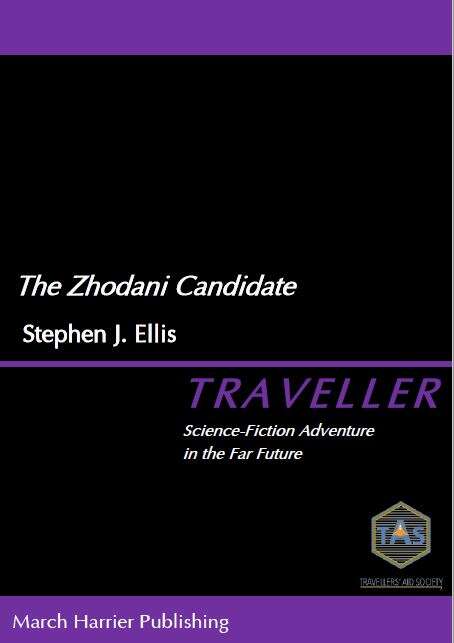The Zhodani Candidate
This article originally appeared on rpg-resource.org.uk in January 2020 and was reprinted in the May/June 2020 issue.
 The
Zhodani Candidate. Stephen J. Ellis.
The
Zhodani Candidate. Stephen J. Ellis.
March Harrier Publishing (via TAS)
36pp., PDF
US$4.99/UKú4.01
This is a game of high level intrigue, one when the party gets to meet the likes of Duke Norris of Regina. The format is very open: the party are part of an Imperial task force whose mission is to ensure that the war-hero Marine whom the heir of the Duke of Mora is due to wed is no more than he purports to be despite a period of captivity in Zhodani hands. Designed as a one-off, each character represents a different agency, and are provided with their own personal agenda as well as that of their parent agency, carefully crafted to ensure that they will come into conflict with each other during the course of their investigations… indeed, one character’s agency thinks that it is one of the other characters, rather than the would-be bridegroom, that is a Zhodani spy! There are several other subplots in play concerning the bride’s parentage, a few star-crossed lovers, and more to weave into the mix as well.
Much of this is discussed in the Introduction and Background, and you should study these carefully, along with the full characters provided, before play. It’s suggested that if you know the players, you should allocate them according to each player’s strengths and weaknesses; alternatively, give an overview of public knowledge about each character and let the players choose, or even distribute them at random. Give them plenty of time to absorb everything about their character before play begins so that they have a chance to really get into character. It’s useful if there is somewhere for private conversation—between players or for chats with you as Referee—or at least material for passing notes around the table. If played at a convention, you may wish to stipulate that no player-character can be murdered/sent into exile/otherwise eliminated from the game, or at least not until towards the end of the play slot, so that nobody feels cheated. An optional basic Trust mechanic is provided, should you want a public track of which character trusts who…
You may well have revealed the main objective even before distributing the characters, but the game proper begins with the first meeting of the Task Force. This is an opportunity for the characters to introduce themselves before one of them takes the chair and the group can discuss how they wish to proceed. A lot of information that’s available to the Task Force (provided they ask for it) is provided.
The first part of the adventure involves the characters conducting the vetting of the war-hero bridegroom (and whatever else the characters decide to do). If the decision is that he is not influenced by the Zhodani, the wedding can proceed as planned. If they decide he’s unsafe, there are various options, including the wedding going ahead with a different groom. Should there be a wedding, the next part of the adventure unfolds. The Task Force will be invited to check the guest list for undesirables, and get to attend the wedding itself. If you have previously banned violent interaction between player-characters, this is a good time to permit it.
Hints and tips for keeping things moving are provided, along with a wealth of background information. Prior preparation will pay dividends, this will be most effective if you can respond instantly to whatever the party says or does… and if the main plot and their personal sub-plots aren’t enough, there’s a collection of other things that you can throw in as well; as well as suggestions for locations that can be used for the inevitable private meetings to further intrigues (which may or may not offer scope for eavesdropping…).
If you like role-playing-heavy games with lots of intrigue, you’ll love this. Bear in mind that it really only works as a one off… although with a lot of ingenuity and plot-twisting you might be able to find a way to use the characters (as NPCs) and situation in a campaign if you can think of a reason why your regular party might be around and drawn in to what’s going on. That’s not really what it’s designed for, though. If you prefer to use the Cephus Engine ruleset, there are some brief notes on skills conversion, although this game does not lend itself to lots of die rolling anyway.
 Freelance
Traveller
Freelance
Traveller